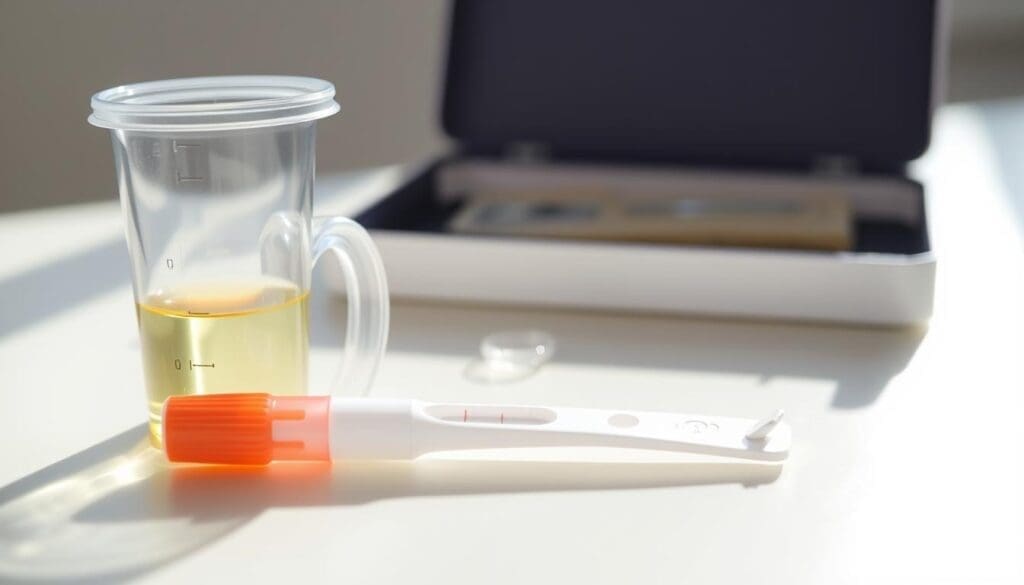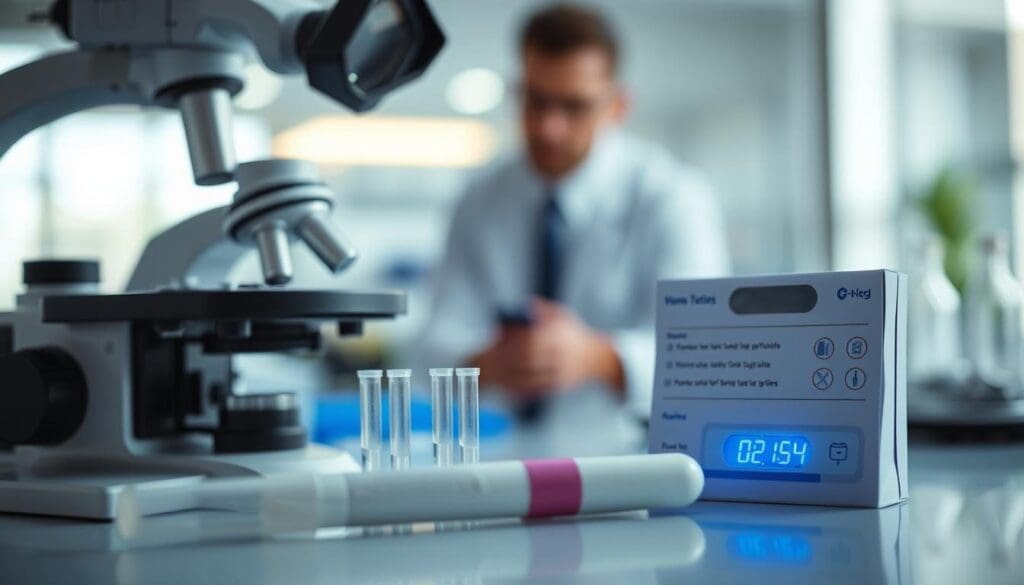
Understanding male fertility is now easier thanks to home sperm analysis test kits. We can check sperm count at home, a big step for reproductive health. Learn how to check sperm count at home. Complete guide to methods, kits, and costs for accurate sperm testing.
These kits can tell if there are sperm in the semen and some check how well they move. You get results in minutes, and it’s cheaper than lab tests. At Liv Hospital, we focus on you, providing the best home sperm tests, accurate methods, and cost info.
Key Takeaways
- Home sperm analysis kits provide a convenient and cost-effective way to check sperm count.
- These kits can determine the presence of sperm in a semen sample and some assess sperm motility.
- Results from home sperm tests are typically available within minutes.
- The cost of home sperm tests is generally lower than laboratory tests.
- Liv Hospital offers modern solutions and patient-centered care for male fertility checks.
Understanding Male Fertility and Sperm Count

Learning about male fertility starts with understanding sperm count. It’s a key part of knowing how fertile a man is. Sperm count is just one piece of the puzzle, along with sperm health and fertility.
What Is Sperm Count and Why It Matters
Sperm count is the number of sperm in a man’s semen. It’s very important for fertility because it affects fertilizing an egg. More sperm means a better chance of fertilizing an egg.
“A normal sperm count is at least 15 million sperm per milliliter of semen,” says clinical standards. This number shows if a man can be fertile. Men with fewer sperm might find it harder to conceive.
Normal Sperm Count Parameters
Knowing what’s considered normal sperm count is key. The World Health Organization says it’s at least 15 million sperm per milliliter. But, sperm quality and how well they move are also important.
Here’s a breakdown:
- Sperm concentration: At least 15 million sperm per milliliter.
- Total sperm count: At least 39 million sperm per ejaculate.
- Motility: At least 40% of sperm should be moving.
- Morphology: At least 4% of sperm should have a normal shape.
Factors Affecting Sperm Health
Many things can affect sperm health. Lifestyle choices, environmental exposures, and medical conditions play a role. For example, toxins, high fever, and some infections can harm sperm.
Also, smoking, too much alcohol, and being overweight can lower sperm quality. But, eating well, exercising, and managing stress can help sperm health.
“Changing your lifestyle can greatly improve sperm health and fertility. Making smart choices can boost sperm count and fertility.”
In summary, understanding male fertility and sperm count is complex. It’s not just about the count but also the factors that affect it. Knowing these details helps men take steps to improve their fertility.
Home Testing vs. Clinical Testing: Pros and Cons

It’s important to know the pros and cons of home sperm testing versus clinical testing. Both have their good points and bad points. These are key to making a smart choice about checking male fertility.
Benefits of Home Sperm Testing
Home sperm testing kits are convenient, private, and affordable. They let you check your sperm count at home, saving you from clinic visits. Home tests are great for first checks and give fast results.
The main benefits of home sperm testing are:
- They are easy to use and understand
- Give quick results
- Keep your privacy
- Are cheaper than clinical tests
Limitations of At-Home Analysis
Home sperm testing kits have their downsides. They can’t check all fertility factors like clinical tests do. They also might not be as accurate, depending on the brand and how well you use them.
| Feature | Home Sperm Testing | Clinical Testing |
| Sperm Count Assessment | Yes | Yes |
| Sperm Morphology Assessment | No | Yes |
| Sperm Motility Assessment | Limited | Yes |
| Cost | $40-80 | Higher |
When Clinical Testing Is Necessary
Clinical testing is needed when home tests show odd results or if you keep having trouble getting pregnant. Clinical tests give a full look at sperm health, including count, shape, movement, and more.
Here’s when we suggest getting clinical testing:
- If home tests show weird results
- If you keep having trouble getting pregnant
- If you think a medical issue might be affecting your fertility
How to Check Sperm Count at Home: Step-by-Step Guide
Checking your sperm count at home is easy if you know the steps. Home sperm testing kits make it simple and private. We’ll show you how to prepare, collect your sample, and understand the results.
Preparing for a Home Sperm Test
First, make sure you understand the instructions in your kit. Each kit is a bit different, so read it carefully. You should not ejaculate for 2-3 days before the test for the best results.
Also, avoid certain medications and substances that might affect your sperm count. If you’re taking any medications, talk to a doctor about it.
Sample Collection Best Practices
Collecting your sample is key for a home sperm test. Here’s how to do it right:
- Use the container provided to collect the semen sample.
- Don’t use lubricants, as they can mess up the test.
- Make sure the sample isn’t contaminated with water or other things.
- Follow the kit’s manual for where to put the sample.
Reading and Interpreting Results
After you’ve done the test, wait for the results as the kit says. Most tests show results in 10-20 minutes. You’ll see lines or symbols on the test strip that tell you the count.
“A normal sperm count is 20 million sperm per milliliter or more. If your count is lower, it might mean you have fertility issues.”
Remember, home sperm tests are helpful but not a full check-up. Always see a healthcare professional for a full fertility check.
Popular Home Sperm Analysis Test Kits
Several sperm analysis test kits are now popular for checking male fertility at home. These kits are easy to use and affordable. They let men check their sperm count and motility without a doctor’s visit.
YO Home Sperm Test: Features and Accuracy
The YO Home Sperm Test is well-known for its simplicity. It quickly measures sperm count in a semen sample. Results are ready in minutes. It’s accurate for counts above 20 million sperm per milliliter, meeting WHO standards.
- Easy to use at home
- Provides quick results
- Measures sperm concentration
SpermCheck: How It Works
SpermCheck is a fast and simple home test for fertility. It detects sperm concentration at or above 20 million per ml. The kit includes a test card and developer solution for easy results at home.
SpermCheck is for men seeking a quick and reliable sperm count check. It’s very sensitive and shows if sperm count is normal.
SwimCount: Testing Sperm Motility
SwimCount focuses on sperm motility, not just count. It measures how many sperm can swim through a special chamber. This test is great for men who want to know about sperm quality, not just quantity.
- Assesses sperm motility
- Provides insight into sperm quality
- Easy to perform at home
Trak: Measuring Sperm Concentration
Trak uses a smartphone app to measure sperm concentration. It comes with a test cassette analyzed by the app. This kit is easy to use and offers digital results.
The Trak test kit can detect sperm concentrations over a wide range. It’s a versatile tool for men checking their fertility. The app provides extra insights and tracks changes over time.
Accuracy of Home Sperm Testing
Men are using home sperm tests more often. It’s important to know how accurate they are. These tests are popular for being easy to use and private, but are they trustworthy?
Understanding Accuracy Rates
Home sperm tests are about 93 to 98 percent accurate. They can give a good first look at sperm count or motility. But, the accuracy can change based on several things.
Key factors influencing accuracy include:
- The quality of the test kit
- Proper sample collection
- Adherence to the test instructions
Common Causes of False Results
Even though home sperm tests are mostly reliable, they can give false results. This can happen because of user mistakes or the test’s limits.
User error can lead to:
- Inaccurate sample handling
- Incorrect interpretation of results
Comparing Home Test Reliability to Lab Tests
Home sperm tests are a good start for checking fertility. But, they can’t replace lab tests. Lab tests check more sperm details, like shape and DNA health, giving a clearer picture.
| Test Type | Parameters Assessed | Reliability |
| Home Sperm Tests | Sperm count, motility | 93-98% accurate |
| Lab Tests | Comprehensive analysis including morphology, DNA fragmentation | Highly reliable |
If a home test shows abnormal results, see a doctor for more tests. Clinical tests can give a better diagnosis and help with fertility issues.
Cost Breakdown: Home Tests vs. Clinical Analysis
The cost of sperm testing changes a lot depending on the method. Home tests are cheaper, while clinical tests are more detailed. Knowing the costs helps when planning for fertility tests.
Price Range for Home Sperm Test Kits
Home sperm test kits cost between $40 and $80. They are easy to use and private. For example, the YO Home Sperm Test is about $50.
Home tests are cheaper but don’t offer as much detail as clinical tests. Yet, they are a good starting point for many.
Clinical Fertility Test Costs
Clinical tests are pricier because they do more. They check sperm count, shape, and movement. Prices can go from $100 to over $1,000, based on the tests and where they’re done.
Experts say clinical tests give a clearer view of fertility problems. But they cost more upfront. This detailed analysis is very helpful for couples trying to conceive.
Insurance Coverage for Fertility Testing
Insurance for fertility tests varies a lot. Some plans cover part or all of clinical tests if they’re needed. But home test kits are less likely to be covered.
It’s key to check with your insurance about what they cover. Knowing this can make fertility testing less stressful.
A study found that insurance can greatly lower the cost of fertility tests. Understanding your insurance is a big step in managing fertility costs.
Where to Purchase Sperm Test Kits
There are many places to buy sperm test kits. Men can find them online or in stores. This makes it easy to get what you need.
Online Retailers and Direct Manufacturers
Online stores are a great place to buy sperm test kits. They offer a wide range of kits from different brands. You can also buy directly from the manufacturers on their websites.
- Amazon: Offers a wide selection of sperm test kits with customer reviews.
- Manufacturer’s Websites: Companies like YO Home Sperm Test and SpermCheck sell their products directly to consumers.
Pharmacy and In-Store Options
Some pharmacies and stores sell sperm test kits. This lets you buy them right away, without waiting for delivery.
- CVS Pharmacy: Some locations may carry sperm test kits.
- Local Health Stores: Specialty stores focused on health and wellness may also carry these products.
What to Look for When Buying a Test Kit
When you buy a sperm test kit, look for certain things. This ensures you get a good product.
- Accuracy and Reliability: Find kits that have been tested and are accurate.
- Ease of Use: Pick a kit that is easy to use, with simple instructions.
- Customer Support: Choose brands that offer good customer support.
- Price: Compare prices to find the best value.
When to Seek Professional Fertility Testing
Home sperm tests give a first look, but sometimes you need to see a fertility clinic. Knowing when to go and what to expect can help you understand your reproductive health better.
Warning Signs That Require Clinical Testing
If you’ve tried to conceive without success or got weird results from a home test, it’s time for a clinic visit. Other signs include a history of infertility, medical conditions, or exposure to harmful substances.
Key indicators for clinical testing include:
- Prolonged inability to conceive
- Abnormal home test results
- History of medical conditions affecting fertility
- Exposure to harmful environmental factors
What to Expect at a Fertility Clinic
At a fertility clinic, you’ll get a full check-up that’s more than just a sperm test. They’ll look at your medical history, do a physical exam, and run advanced tests to check your fertility.
A full fertility check usually includes:
- Detailed medical history and physical examination
- Advanced sperm analysis beyond count and motility
- Hormone level testing
- Genetic screening
Comprehensive Sperm Analysis Parameters
A detailed sperm analysis at a fertility clinic looks at many things, like count, motility, shape, and DNA health. This gives a better view of sperm health and spots problems home tests might miss.
Parameters checked in a detailed sperm analysis include:
- Sperm count and concentration
- Motility and progressive motility
- Morphology and percentage of normal forms
- DNA fragmentation index
- Other advanced parameters depending on the clinic’s capabilities
Conclusion: Making Informed Decisions About Sperm Testing
It’s important for men to know about sperm testing options and limits. This article has covered different ways to check sperm count at home and in clinics.
Home tests like the YO Home Sperm Test and SpermCheck are easy and private. But, they might not always be accurate. Clinic tests give a detailed look but take more time and money.
Men should think about their own needs when choosing a sperm test. Privacy, detailed analysis, and cost are key factors. These help decide the best test for each person.
Knowing about sperm testing options helps men take charge of their fertility. This knowledge lets them make smart choices about their reproductive health. It’s a step towards better overall well-being.
FAQ
How much does a sperm test cost?
The price of a sperm test varies. Home test kits cost between $40 to $80. Clinical tests, though, can be pricier, often over $300.
What is a normal sperm count?
A normal sperm count is at least 15 million per milliliter. But, it can be between 39 million to 928 million per ejaculate.
How accurate are home sperm tests?
Home tests are 93% to 98% accurate. But, their results can be affected by user error and the test kit’s quality.
Can I check my sperm count at home?
Yes, you can use a home sperm test kit. These kits are sold online and in some pharmacies. They’re a cheap and easy way to check your sperm count.
What factors affect sperm health?
Many things can impact sperm health. Lifestyle choices, environmental exposures, and medical conditions are key factors. Smoking, too much alcohol, and toxins can harm sperm quality.
When should I seek professional fertility testing?
If you’ve been trying to conceive for over a year, or if you’re worried about your sperm health, see a fertility clinic. They offer a detailed evaluation and advice.
What can I expect at a fertility clinic?
At a fertility clinic, you’ll get a full fertility check. This includes a semen analysis and other tests. They’ll look at sperm count, motility, and shape to understand your fertility.
Are home sperm tests as reliable as laboratory tests?
Home tests are usually reliable but not as precise as lab tests. Lab tests offer a more detailed look at sperm health.
How do I prepare for a home sperm test?
To prepare for a home test, follow the kit’s instructions. You’ll likely need to wait a certain time after ejaculation before collecting a sample.
Where can I buy a sperm test kit?
You can find sperm test kits online or in stores. Look for them in retailers, pharmacies, or stores that sell fertility products.
References
National Center for Biotechnology Information. (2025). How to Check Sperm Count at Home Methods. Retrieved from https://pmc.ncbi.nlm.nih.gov/articles/PMC8443999/



































